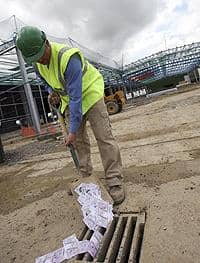The problem is not necessarily a lack of information available – with a wealth of organisations now available to help firms reduce waste, including BREW, Envirowise, NISP and WRAP.
Speaking to the Lords' Science Committee, industry body PICME said the problem is that individual small businesses find it hard to apply generalized or isolated case studies to their specific situations.
Its chief executive, Michael Glass, said: “The single biggest barrier to reducing waste or improving production is a lack of awareness among senior people within business about the opportunities it brings.
“Getting access to basic information is not difficult, it's understanding how to implement that that is the problem,” he said.
Red tape
Among the other witnesses giving evidence to the Lords' “Waste Reduction” inquiry, John Holbrow of the Federation of Small Businesses pointed out that while might be information available to companies, they have so much environmental red tape to deal with to meet legal requirements, they do not prioritise the need to cut down on waste.
Mr Holbrow, who chairs the FSB's environment committee, said: “There's lots of information there, but amongst the owners of small businesses there's so many other things they have to do, they don't see the profit improvements involved in cutting waste.”
Martin Gibson, chief executive of the government's business environmental advice service Envirowise, said his experience suggested that getting different parts of a company to talk to each other about the issue of waste and how it impacts on a company's internal budget was a key to improving resource efficiency.
He pointed out that using the term “resource” rather than “waste” was important in getting the issue seen as a management issue within businesses.
“'Waste' tends to be dealt with at a level far below management level,” Dr Gibson said, “Whereas 'resource use' tends to be a management issue. We need this to be a management issue.”
Reduction
Looking at methods for small businesses to cut their waste generation, Mr Glass said told peers that the first step is to get companies to measure how much waste is being produced.
Many companies do not realize how much waste they produce, and therefore do not see the need to change their production process, he said.
Mr Glass explained: “We are working with a business in which 14% of material in the process ends up as waste, because in the process there is a need for purity. They had no way of gauging whether that 14% was good or bad. After a bit of persistence, they agreed to try to have a go at a more structured approach that got the 14% down to 4%.
A lot of waste that small businesses produce is not really of interest to recyclers because there is not enough of it in one place.
John Holbrow, Federation of Small Businesses
“It was recognising that some of the material being thrown away had a commercial value. They didn't see it because they didn't measure it.”
Claire Barlow of the Institute for Manufacturing at the University of Cambridge, said that while small businesses might have little influence in changing their supply chains to cut waste, what they could do was reduce the defects in their production process.
And, she pointed out the importance of cutting paper waste in offices. “For some companies, even office waste can be quite a large amount of the waste they produce,” Dr Barlow said.
Recycling
Getting small businesses to recycle their waste was also highlighted by Mr Holbrow, who said SMEs are keen to recycle rather than send material to landfill – but often find it difficult to find somewhere to recycle their waste.
Business waste either goes to commercial waste contractors, or straight to landfill, he said. “More needs to be done to help small businesses to recycle their waste – they want to do it, but there's nothing there to help them.”
Mr Holbrow told the Lords Committee: “A lot of waste that small businesses produce is not really of interest to recyclers because there is not enough of it in one place. If small businesses could use CA sites for recycling it would certainly help, but when you are told when you get to a CA site to go away, that's not conducive to getting small businesses to recycle more.”
The chairman of the FSB's environment committee praised efforts under the Waste Electrical and Electronic Equipment Directive allowing householders to take electrical goods to civic amenity sites for recycling, and said he hoped such work could be expanded to other waste streams.
Courtauld
During the hearing today, the Lords also heard from Liz Goodwin of the Waste and Resources Action Programme about the efforts to cut retail waste through the Courtauld Commitment.
Dr Goodwin, WRAP's chief executive, explained that the Commitment was designed for large organisations, rather than small businesses, but would spur action running down the retailers' supply chains.
She explained that the benefits to those retailers had been that the Commitment represented a response to their customers' environmental concerns, had cross-cutting financial benefits from better resource use and also provided a stimulus for innovation within the retailer supply chains.
Dr Goodwin suggested measures similar to the Commitment could be used in other areas – potentially the construction industry and electronic goods.










Subscribe for free